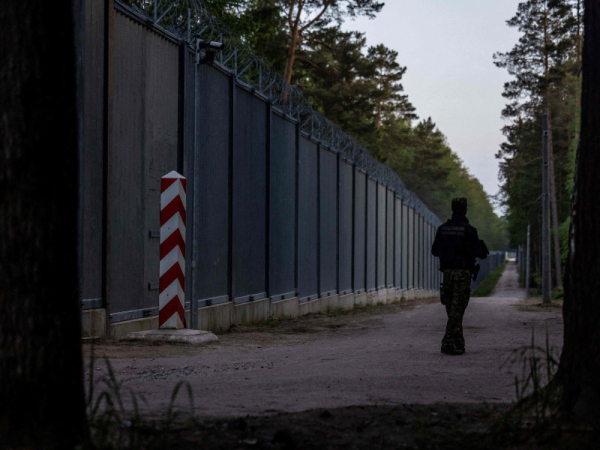
A border guard on patrol at the border wall between Poland and Belarus outside Bialowieza, Poland, on 29 May 2023. Over half of Finns view that it should be possible to turn away migrants at the external borders of the EU even if doing so put their life in danger, reveals a survey conducted as part of Natopoll. (Wojtek Radwanski – AFP / Lehtikuva)
- Next Article In April, house prices fell in all large cities in Finland except Turku
FINNISH VOTERS have a noticeably more hardline stance than candidates on the prospect of turning away migrants seeking entry to the EU, reveals a policy brief published as part of Natopoll.
The brief indicates that 52 per cent of the public view that it is possible to turn away migrants at the external borders of the 27-country bloc even if doing so exposes them to mortal danger. Only 28 per cent of Finnish candidates in the European elections share the view, reveals the election compass of YLE.
The idea of denying migrants entry to the union is popular especially within the Finns Party. Almost nine in ten (89%) of the populist right-wing party’s supporters and 67 per cent of its candidates supported the idea. No Green League or Left Alliance candidate contrastively supported the view, despite some support – 17 and 18 per cent, respectively – among supporters of the two opposition parties.
At the same time, the survey respondents identified a defender of human rights and a defender of the rule of law as the two most applicable characterisations of the role of the EU.
The survey conducted for the policy brief also found widespread public support for supporting Ukraine.
According to 52 per cent of respondents, EU countries should dispatch troops to help the country if it was at risk of losing the war prosecuted by Russia. The view was shared by 45 per cent of the candidates covered by the election compass of YLE.
There were some party-specific differences, however. Left Alliance supporters backed the idea at a rate of 58 per cent compared with 16 per cent of the left-wing opposition party’s candidates. National Coalition supporters backed the idea at a rate of 51 per cent compared with 75 per cent of the right-wing ruling party’s candidates.
Hanna Wass, a political scientist at the University of Helsinki, said to YLE that the survey and election compass respondents were provided with different options: while the candidates were able to choose between fully agree, partly agree, partly disagree and fully disagree, the survey respondents had to choose between yes and no.
“When you have to respond ‘yes’ or ‘no,’ the differences become clearer,” she explained.
Wass is a co-author of Natopoll.
While it is difficult to pinpoint clear reasons for the differences of view between voters and candidates, she did detect one clear trend in the results: Finns largely agree about the need to stand by Ukraine.
Up to 42 per cent of the public stated that even if the country failed to satisfy all the membership criteria, they would be prepared to welcome the country into the EU. The view was shared by 17 per cent of European election candidates in Finland.
Wass estimated that the divide could be evidence of distinct approaches taken to the surveys: the public may be weighing up what is ethically and morally right, the candidates what is politically realistic.
The Natopoll report also reveals that information warfare, cyber operations and transnational crime are regarded as the most significant threats facing Finland. The first two were identified as very large or relatively large threats by 91 per cent of respondents, the third as a very large or relatively large threat by 77 per cent of respondents.
Wass told YLE that Finland’s accession to Nato appears to have alleviated concerns about more traditional military threats, such as an armed attack.
“Of course Russia’s hybrid operations underlie the results. Voters feel that these kinds of risks are real and that we have to have tools to combat them,” she commented.
More than 1,600 Finns responded to the survey on 18–24 April. YLE’s election compass, in turn, consists of responses from slightly over 200 people who are vying for a seat in the European Parliament.
The European elections are held in Finland on 9 June, with advance voting possible between 29 May and 4 June.
Aleksi Teivainen – HT
- Next Article In April, house prices fell in all large cities in Finland except Turku
Source: www.helsinkitimes.fi
